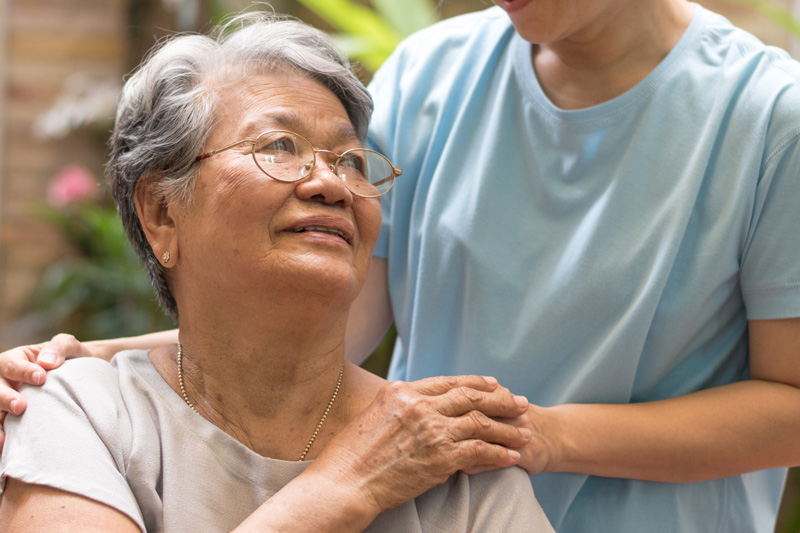 Though most people imagine retirement surrounded by family or in some exotic location, the truth is that most Americans prefer to enjoy their golden years at home. In fact, a recent AARP report found that 77% plan to age in place. While this gives older adults the benefit of being in a place they know and love, they may still benefit from having professional assistance—especially as 80% of older Americans have a chronic health condition.
Though most people imagine retirement surrounded by family or in some exotic location, the truth is that most Americans prefer to enjoy their golden years at home. In fact, a recent AARP report found that 77% plan to age in place. While this gives older adults the benefit of being in a place they know and love, they may still benefit from having professional assistance—especially as 80% of older Americans have a chronic health condition.
But home-based care is not one-size-fits-all. Should you and your parents be deciding on what kind of assistance to consider, there are some basic qualities and differences to keep in mind.
Home Healthcare vs. Home Care
The first thing you’ll have to consider is whether your parent requires home healthcare or home care. But what is the difference between the two?
Home healthcare is one of many terms for assistance that includes limited medical support. This can include nursing care, health aides, and various types of therapy like occupational, physical, and speech. Usually, to qualify for home healthcare, an older adult will require an official doctor’s request. For instance, if leaving their home takes significant effort or they are dealing with a chronic condition, like diabetes, then that may require home healthcare. Home healthcare services are also typically offered for 60-day periods, though this can be shortened or extended depending on the supervising doctor’s advice. Among the many home healthcare specialists, the most common are therapists and nurses with different disciplines.
Meanwhile, home care is a non-medical form of assistance that is still deemed critical in many cases. In fact, a study by John Hopkins shows that about 25 million older Americans rely on some form of home care as they age in place. Because home care doesn’t necessarily require sensitive medical intervention, qualifying for this service doesn’t require a doctor’s request. The length of home care service can also be a little more flexible, and the terms can be determined between the home care provider and the patient.
What Does a Stay-At-Home Nurse Do?
Should you opt for home healthcare, you’re more likely to be cared for by a registered nurse with training in geriatrics. Because their responsibilities include caring for more delicate conditions, these nurses will have completed an RN to BSN degree, which provides them with an in-depth understanding of genetics, family assessment, and psychology. And thanks to their ensuing nursing training, these professionals can execute medical treatments and emergency aid for age-related conditions, if need be. Some of the responsibilities that a home care nurse can fulfill are:
- Tracheostomy
- Injections
- Therapy
- Monitoring Vitals
- Colostomy
- Wound cleaning
- Changing ports or necessary tubes
- Administering Medications
- Communicating patient well-being to supervising doctors
What Does a Home Caregiver Do?
If you’re considering home care, this means you’ll be working with a certified caregiver. Although these professionals are not licensed to administer medical treatments, they are required to have completed caregiver certification courses. These programs, which are usually offered by colleges, vocational schools, and organizations like the American Red Cross, teach valuable skills, like housekeeping, hygiene, home safety, and basic patient care. This means that while caregivers’ medical expertise is more limited, they can provide companionship in the form of conversation, playing card games, or watching movies, which ultimately can improve mental health. A few other examples of what caregivers can offer are:
- Hygiene assistance
- Meal preparation
- Light housekeeping
- Basic errands
- Basic medical assistance (usually limited to organizing medications and administering non-critical care)
But What If My Parent Doesn’t Want Any Help?
If your parents are a little apprehensive about receiving professional home care, remember to be understanding. For many older adults, onboarding a nurse or caregiver is tantamount to admitting they are frail and unable to care for themselves. This is why it’s important to frame this event in a positive light. Explain to them that having a care specialist does not imply that they’re incapable of caring for themselves, but rather that they take their wellness seriously enough to invest in professional help.
For more on aging in place, health tips, and the latest in life after 50, visit our blog often!
Post solely for the use of fiftyforward.org
Written by Alicia Adler
Alicia was raised by her loving grandmother and hopes to return the favor by developing the skills necessary in caregiving to care for older adults. In addition to her nurses’ training, she is currently a full-time mom to her infant daughter and a toddler.


